
CloseUp View To Cellophane Noodles (Also Known As Chinese Vermicelli, Bean Thread Noodles
Bean thread noodles, also named as mung bean noodles, cellophane noodles or bean vermicelli is a popular non-flour noodle in Chinese cuisine.It is healthy, easy to prepare and always taste great in stir-fry dishes, soups, stews and salad. Bean thread noodles (中(zhōng)文(wén):绿(lǜ)豆(dòu)粉(fěn)丝(sī)) belongs to glass noodle group.
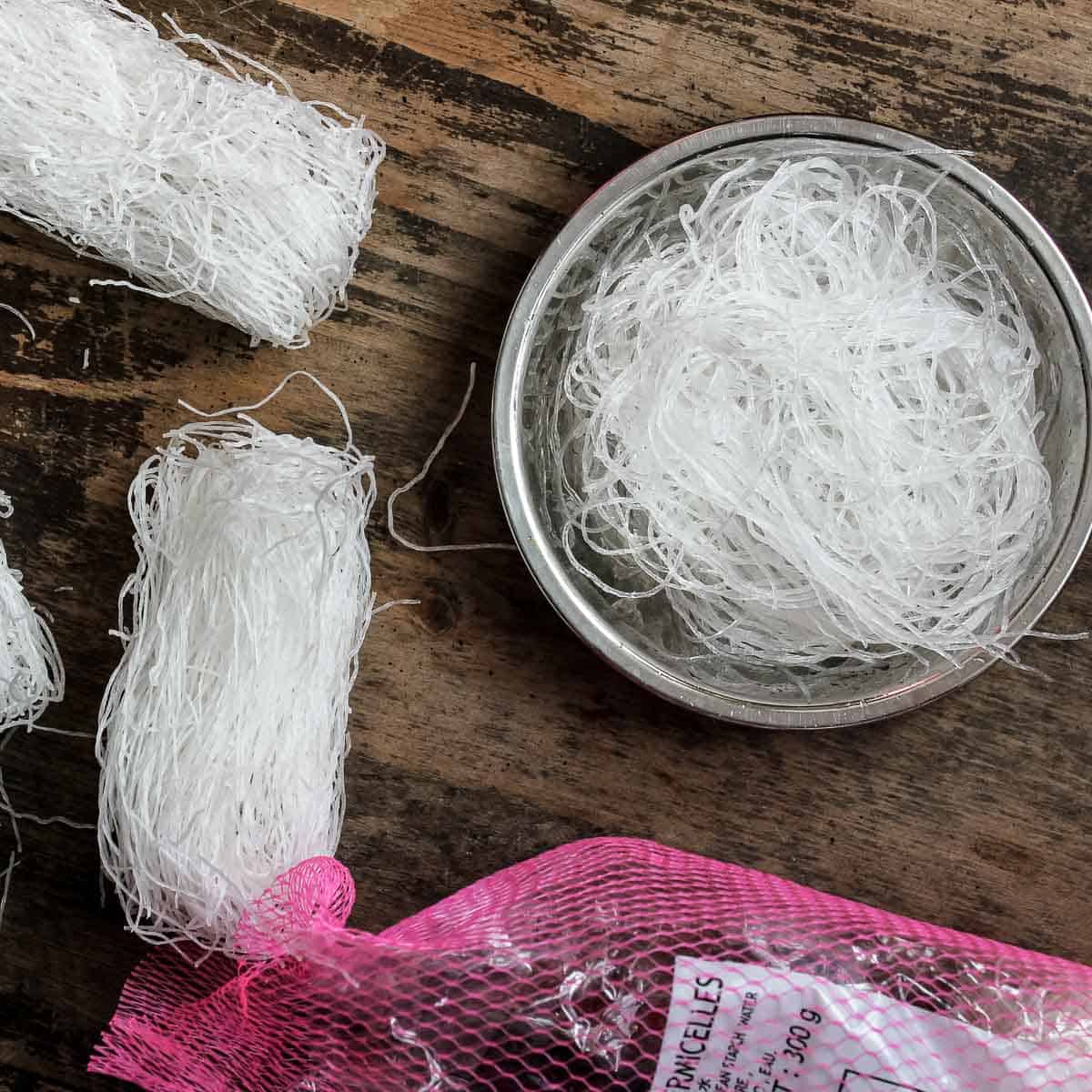
Bean Thread Noodles Pups with Chopsticks
Cellophane noodles, or fensi (traditional Chinese: 粉絲; simplified Chinese: 粉丝; pinyin: fěnsī; lit. 'flour thread'), sometimes called glass noodles, are a type of transparent noodle made from starch (such as mung bean starch, potato starch, sweet potato starch, tapioca, or canna starch) and water. A stabilizer such as chitosan (or alum, illegal in some jurisdictions) may also be used.
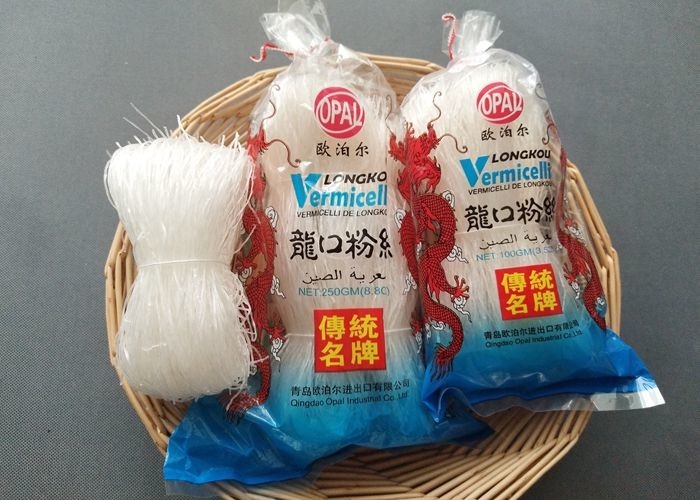
Glass Cellophane Bean Thread Noodles
1 (8-ounce or 250 g) package cellophane noodles (bean thread noodles) 2 tablespoons vegetable oil 2 tablespoons minced garlic 1 cup (150 g) sliced yellow onion 2 cups (200 g) chopped broccoli (cut to a similar size as the other vegetables) 4 cups (400 g) shredded cabbage 2 teaspoons fine sea salt, divided
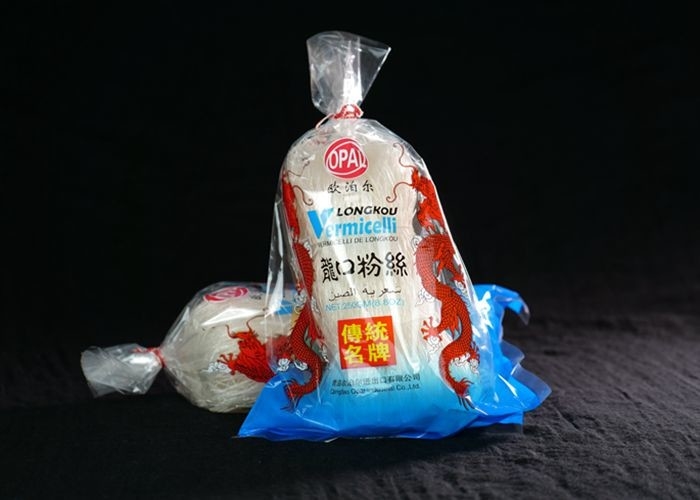
100g Gluten Free Chinese Asian Cellophane Bean Thread Noodles
Glass or cellophane noodles (also known as fensi or bean thread noodles) are transparent noodles that, when cooked, are clear like glass. They are used in Asian soups, hot pots, stir-fried dishes, and spring rolls. Glass noodles are typically sold dried and are soaked before eating.
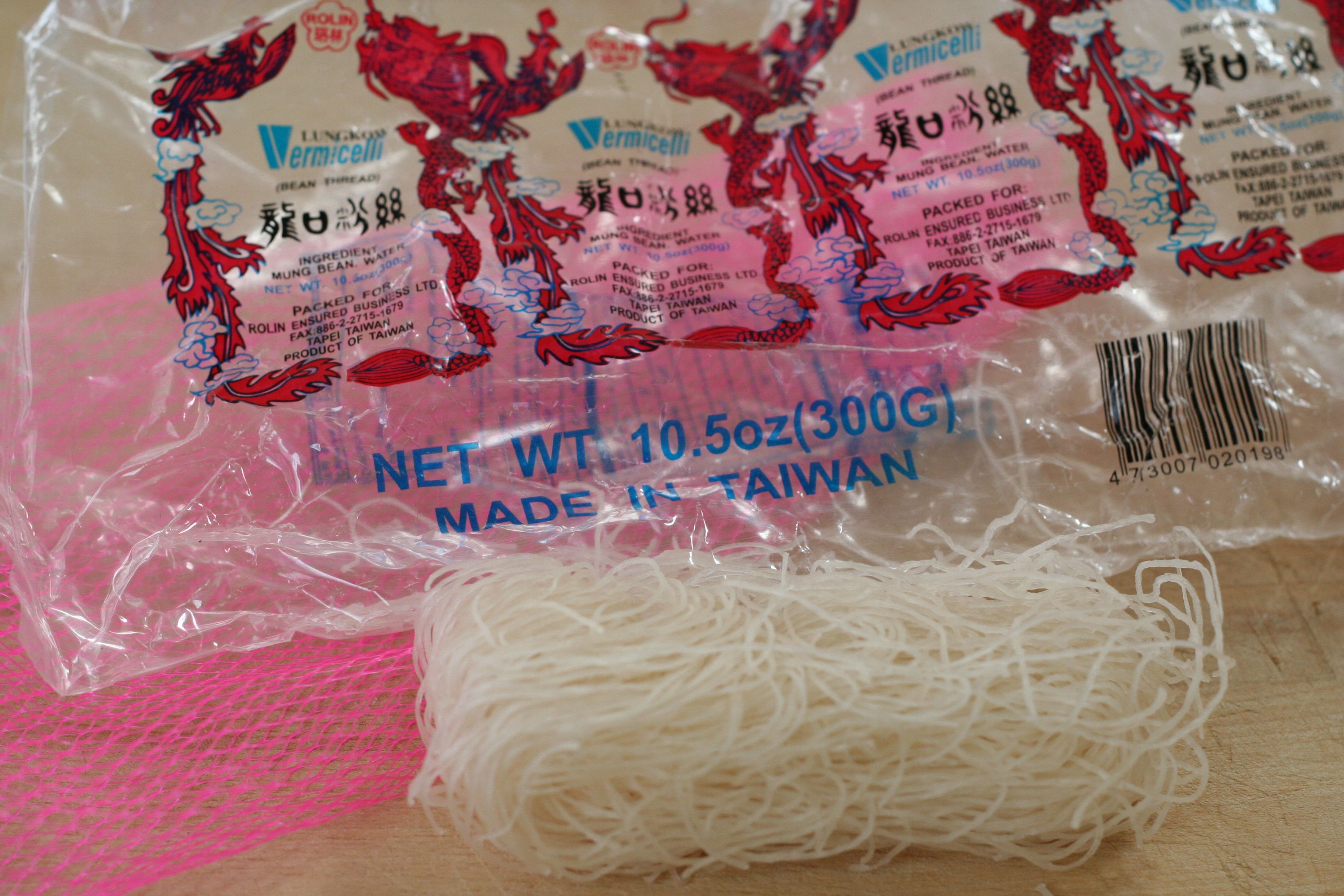
Bean Thread Noodles with Veal, Tomatoes, and Mint Cooking with Drew
Well, glass noodles, also called cellophane noodles or bean threads, are long, thin noodles commonly used in Chinese, Korean, Japanese, Thai, Filipino, and other East and Southeast Asian cuisines. They're made from the starch of mung beans, potatoes, sweet potatoes, and/or tapioca and they look almost translucent when you cook them..
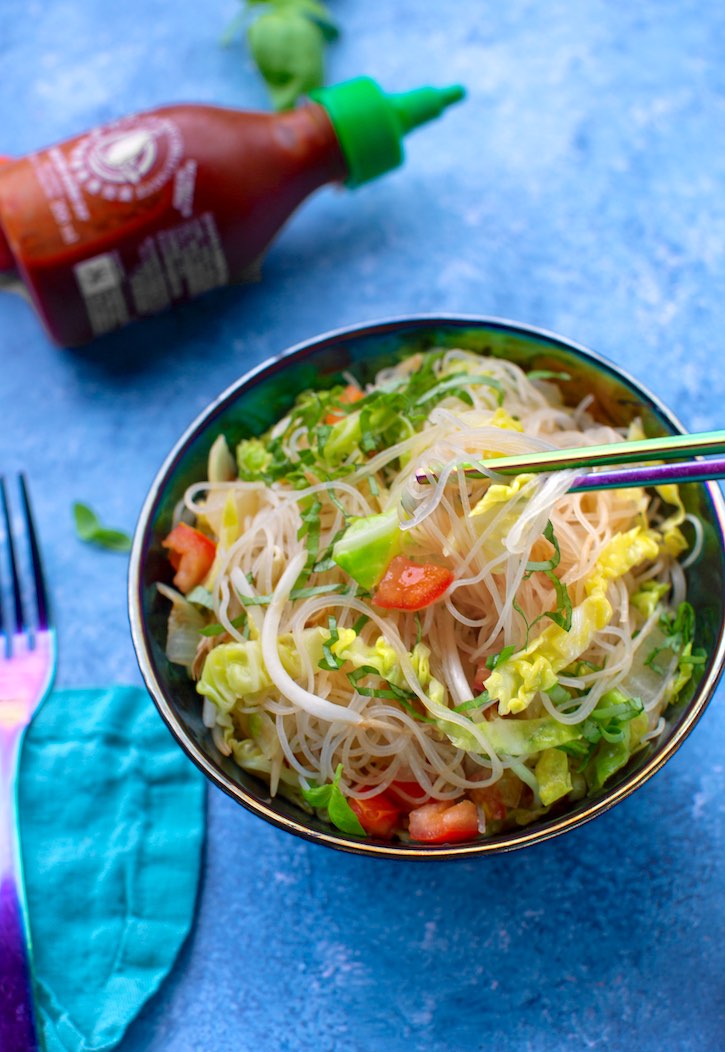
A Guide to BeanThread Noodles (aka Cellophane or Glass Noodles)
Here's a quick guide to bean-thread noodles, also known as cellophane noodles and glass noodles, among other names — with how to buy and prepare them, with links to recipes. You may find them marketed as mung bean noodles (or mung bean vermicelli), glass noodles, Korean glass noodles (japchae), saifun, or harusame.

A Dose of Frosting.. Sauteed Bean Thread Noodles
Glass noodles, also known as, cellophane noodles, bean thread noodles, mung bean noodles, Chinese vermicelli, and in Thai "woonsen (วุ้นเส้น)," are noodles made from mung bean starch. These noodles are mostly sold dried in packets and you need to soak them per package instructions. But usually, takes less than 7 minutes to soak.
/185219702-56a8a7553df78cf7729f6e06.jpg)
What Are Glass Noodles?
160g (5.6 oz) dried glass noodles (also known as mung bean, cellophane, bean thread noodles) 2 tbsp vegetable oil. 3 garlic cloves, finely chopped. 1 onion, sliced. ½ cup shredded carrot. 2 eggs, lightly whisked. 1 large mild red chilli, deseeded, finely sliced. 3 spring onions (scallions), cut into batons Marinade: 1 tsp fish sauce. ¼ tsp.

Cellophane Noodles Ingredient FineCooking
Asian aisle, dried thin white noodle sticks labelled bean thread vermicelli noodles or variations thereof: bean thread glass noodles, glass noodles, or just bean thread. The packet I get is pictured above. Made from the starch of mung beans, they're also commonly known as cellophane noodles and just require soaking in boiling water to rehydrate.

A Guide to BeanThread Noodles (aka Cellophane or Glass Noodles)
100 g Glass noodles About 3.5 oz ( Cellophane noodles or bean thread noodles, See details in note. 200 g Chicken breast About 7 oz ( Boneless skinless chicken thigh or breast ) 2 Eggs Whisked and season with a pinch of salt 100 g Cabbage About 3.5 oz ( Cut thin slices ) 1 Carrot Cut matchstick sizes ½ Onion Cut thin slices
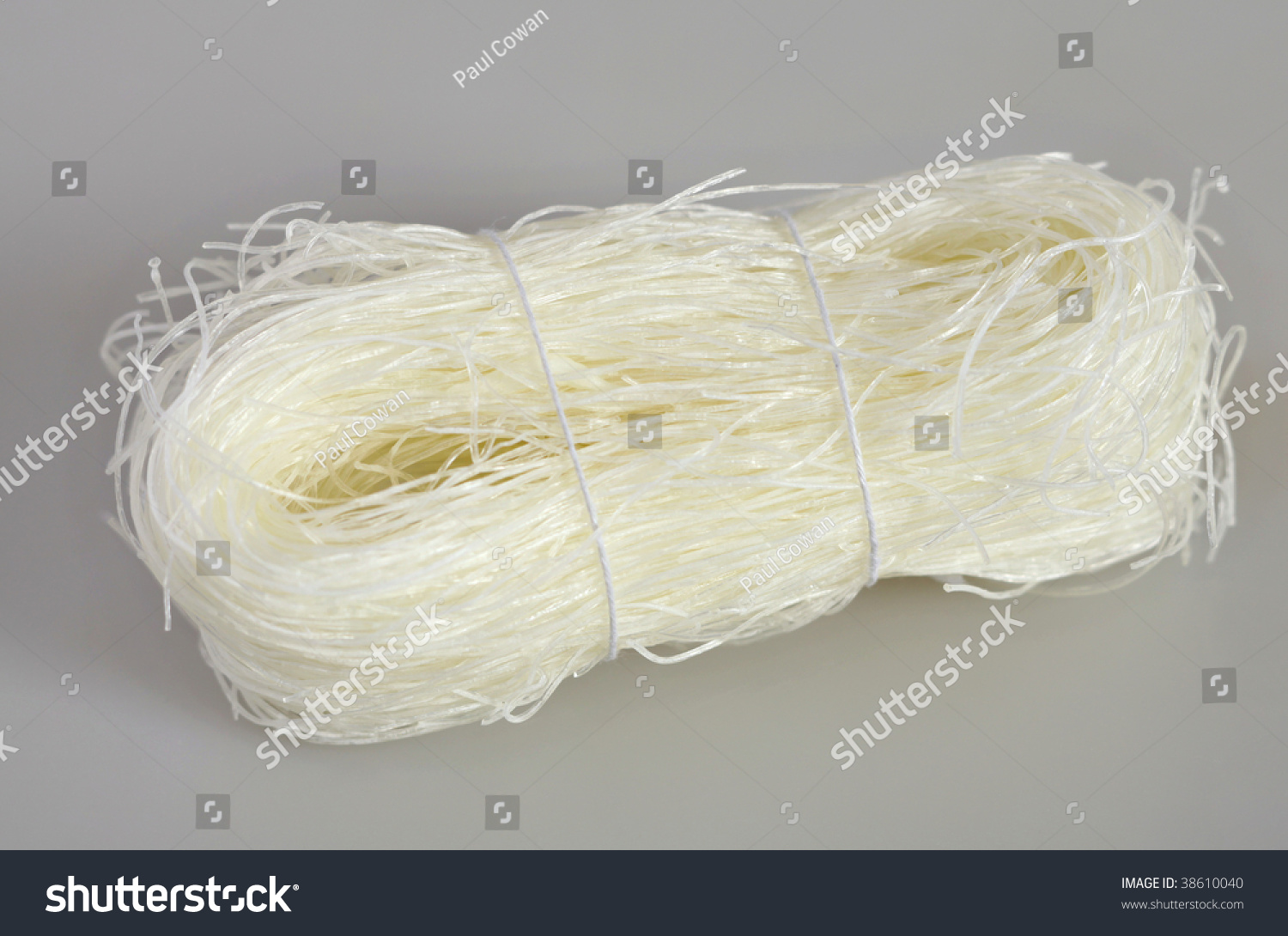
A Bundle Of Uncooked Chinese Cellophane Noodles Or Glass Noodles, Also Known As Chinese
Glass noodles, also called cellophane noodles, silver noodles, and bean thread noodles, are a type of very thin noodle made from mung bean starch and sometimes additional starches like sweet potato starch or pea starch. They're naturally gluten-free, fairly low-carb, and low-calorie, too.
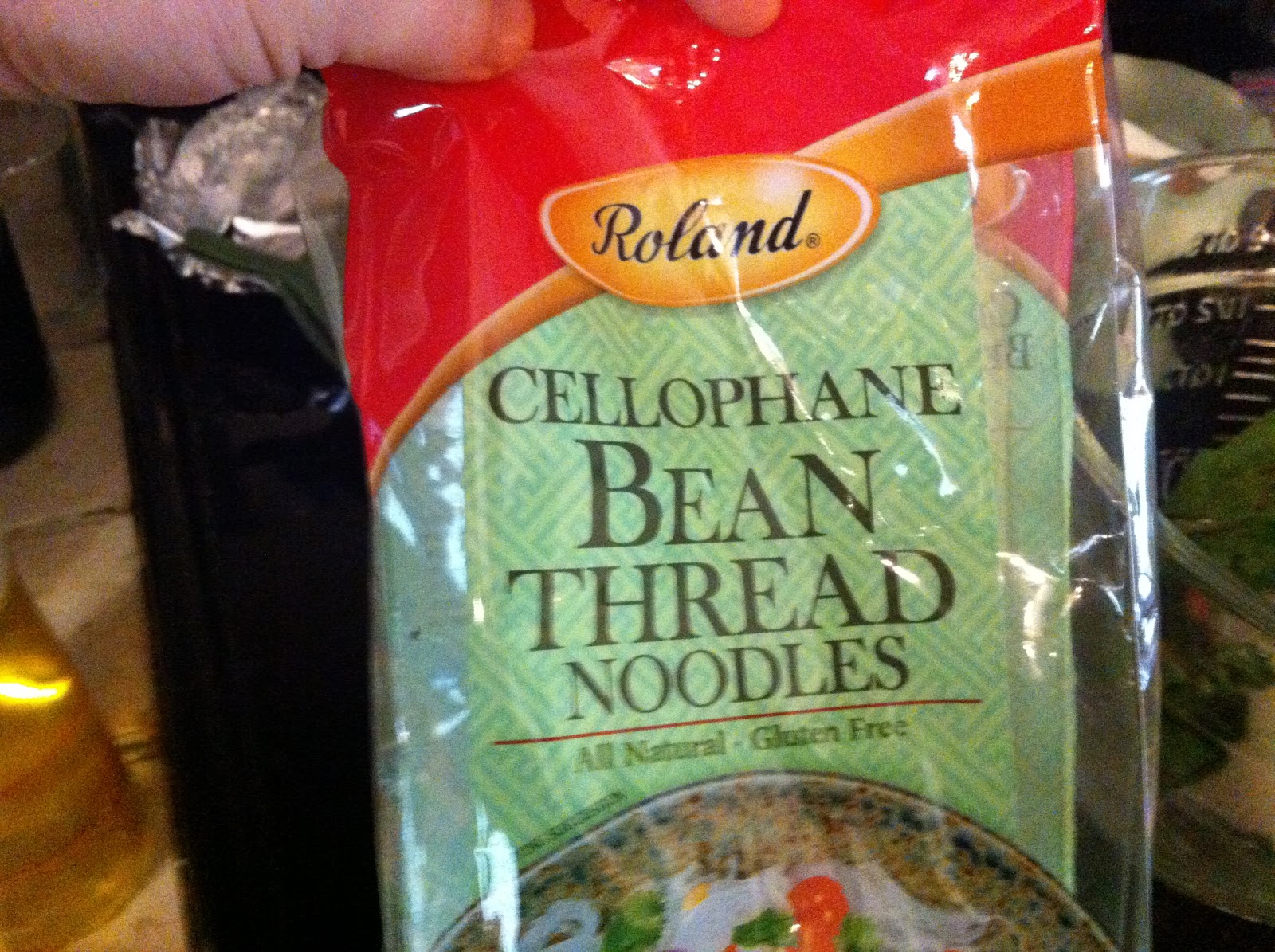
The Fast and the Epicurious Easy, Healthy Cellophane Bean Thread Noodle Soup
Bean thread noodles are also known as Chinese vermicelli, bean threads, crystal noodles, and glass noodles. Though commonly found in Chinese cuisine in stir fries hot pot meals, and even in shark's fin soup, these noodles can also be found as an ice cream topping in India, and in Thai cuisine in a spicy and sour seafood salad.

Mung Bean Vermicelli or Cellophane Noodles, a Transparent Thread Stock Image Image of cuisine
These stir-fried Bean Thread Noodles feature slices of savory chicken, crisp veggies, and tender noodles tossed in a flavorful sauce. It's a delicious one-dish meal that is ready to eat in just 30 minutes.. Also known as cellophane noodles, glass noodles, and Chinese vermicelli, bean thread noodles are made with mung bean flour. The.

Cellophane Noodles World Finer Foods
2. Soak cellophane noodles in warm water for 15-20 minutes. Remove and cut into 4-5" lengths. 3. Heat oil in wok over medium-high heat. Add ginger, green onions and red pepper. Stir for 15 seconds. Add ground beef and stir for 1 1/2 minutes. 4. Add soaked cellophane noodles; stir for 30 seconds. Put in remaining ingredients and mix well. Reduce.

"cellophane noodles also known as chinese vermicelli, bean threads, bean thread noodles, crystal
1/2 package cellophane noodles (aka bean thread noodles) 1 tablespoon cornstarch 1 cup light coconut milk 1 tablespoon vegetable or canola oil 1 small onion, diced 1 red bell pepper, diced 1 garlic clove, minced 2 teaspoons fresh ginger, minced 2 scallions, chopped 2 teaspoons kosher salt 1 teaspoon curry powder

Roland Cellophane Bean Thread Noodles (8.8 oz) Instacart
These hearty, no-nonsense dishes were made using local, fresh produce - freshly baked homemade bread, noodles, a plethora of various types of dumplings along with things like home-reared meat, farm-produced cheeses, and river fish.